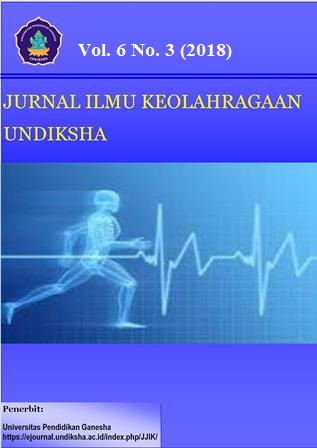PENGARUH PELATIHAN THREE CORNER DRILL TERHADAP PENINGKATAN KELINCAHAN DAN POWER
DOI:
https://doi.org/10.23887/jiku.v6i3.2648Abstrak
Penelitian ini bertujuan untuk mengetahui pengaruh pelatihan three corner drill terhadap kelincahan dan power otot tungkai. Jenis penelitian adalah quasi experimental dengan rancangan the non-randomized pretest-posttest control group design. Subjek penelitian yang digunakan siswa putra peserta ektrakurikuler sepak bola SMPN 2 Pekutatan. Data post-test kelincahan dan power otot tungkai pada kelompok perlakuan dan kelompok kontrol dianalisis dengan uji-t independent pada taraf signifikansi (α) 0,05 dengan bantuan program SPSS 16.0. Berdasarkan hasil uji-t independent didapatkan hasil : (1) untuk variabel kelincahan, hasil perbandingan kelompok perlakuan dan kontrol didapatkan nilai thitung = -2,948 , dengan nilai signifikansi 0,009, (2) untuk variabel power, hasil perbandingan kelompok perlakuan dan kontrol didapatkan nilai thitung = 3,176, dengan nilai signifikansi 0,005. Nilai signifikansi hitung lebih kecil dari nilai α (Sig < 0,05), dengan demikian hipotesis penelitian “pelatihan three corner drill berpengaruh terhadap peningkatan kelincahan dan power otot tungkai pada siswa putra peserta ektrakurikuler sepak bola SMPN 2 Pekutatan” diterima. Dari hasil analisis data dan pembahasan disimpulkan bahwa : (1) Pelatihan three corner drill berpengaruh terhadap peningkatan kelincahan pada siswa putra peserta ektrakurikuler sepak bola SMP Negeri 2 Pekutatan (2) Pelatihan three corner drill berpengaruh terhadap peningkatan power otot tungkai pada siswa putra peserta ektrakurikuler sepak bola SMP Negeri 2 Pekutatan.Kata Kunci : kelincahan, daya ledak, three corner drill
The purpose of this research was to find out the effect of three corner drill training toward the increased agility and power muscle of legs. The type of research was a quasi-experimental and the design of research was the non-randomized pretest-posttest control group design. The subjects were man’s student football extracurricular participants of SMPN 2 Pekutatan. Agility and muscle power of legs posttest to the treatment group and the control group were analyzed by independent t-test at significance 0,05 with SPSS 16.0. Based on independent t-test results were showed : (1) to the agility variable, the comparison of the treatment and the control group values obtained t = -2,948, with a significance value of 0,009, (2) to muscle power of legs variable, the comparison of the treatment and the control group values obtained t = 3,176, with a significance value of 0,005. Calculated significance value smaller than the value of 0,05 (Sig < 0.05), thus the research hypothesis "three corner drill training affect the increased agility and muscle power of legs in football extracurricular participants of SMPN 2 Pekutatan " was received. From the analyzed and discussion were concluded that : (1) three corner drill training effect the increased agility in football extracurricular participants of SMPN 2 Pekutatan, (2) three corner drill training effect the increased muscle power of legs in football extracurricular participants of SMPN 2 Pekutatan.
keyword : Agility, power, three corner drill
Diterbitkan
2018-11-04
Cara Mengutip
Pratama, I. G. A. T., Budiawan, M., & Sudarmada, I. N. (2018). PENGARUH PELATIHAN THREE CORNER DRILL TERHADAP PENINGKATAN KELINCAHAN DAN POWER. Jurnal Ilmu Keolahragaan Undiksha, 6(3), 28–34. https://doi.org/10.23887/jiku.v6i3.2648
Terbitan
Bagian
Articles
Lisensi
Authors who publish with the Jurnal Ilmu Keolahragaan Undiksha agree to the following terms:- Authors retain copyright and grant the journal the right of first publication with the work simultaneously licensed under a Creative Commons Attribution License (CC BY-SA 4.0) that allows others to share the work with an acknowledgment of the work's authorship and initial publication in this journal
- Authors are able to enter into separate, additional contractual arrangements for the non-exclusive distribution of the journal's published version of the work (e.g., post it to an institutional repository or publish it in a book), with an acknowledgment of its initial publication in this journal.
- Authors are permitted and encouraged to post their work online (e.g., in institutional repositories or on their website) prior to and during the submission process, as it can lead to productive exchanges, as well as earlier and greater citation of published work. (See The Effect of Open Access)










